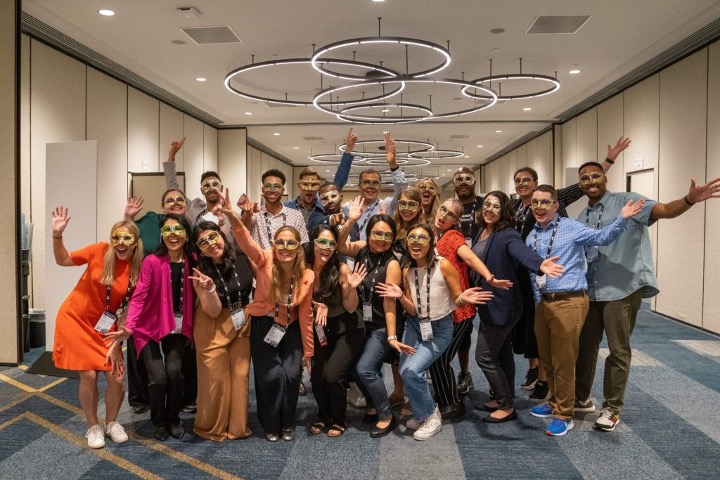Philanthropy has historically been closed-door and top-down, with funding decisions often made by those who are far from the problems it’s aiming to solve. At the Autodesk Foundation, we support innovative solutions to the world’s most pressing social and environmental challenges. In doing this work, we recognize the importance of proximity and diversity in bringing successful impact innovations to scale.
Learn more about the Autodesk Foundation.
When the Autodesk Foundation launched its Diversity, Equity, and Inclusion strategy, we consulted Autodesk’s Diversity & Belonging team. Together, we saw an opportunity to drive positive impact outcomes in the communities represented by Autodesk’s Employee Resource Groups (ERGs)—and in support of that vision, piloted our first Autodesk Foundation and ERG grantmaking initiative last year.
Ramona Blake, senior director of Diversity & Belonging at Autodesk, shared more about this unique collaboration. She added, “In working with the Autodesk Foundation on this program, we aimed to extend ERG reach beyond the walls of Autodesk to nonprofit organizations that are meaningful to ERG members and their communities.”
Learn more about what makes Autodesk one of Forbes’ Best Employers for Diversity 2023.
Upskilling to create customized grantmaking processes for ERGs
The Autodesk Foundation provided Autodesk’s ERGs with $140,000 for unrestricted grant funding to nonprofits of their choice. We used a participatory grantmaking approach, which brings more lived experience and those closest to the issues, and impact solutions, into the funding process.
We upskilled ERG leaders on progressive and strategic grantmaking practices, like the importance of unrestricted grantmaking and other trust-based approaches. We also supported them in developing a formal process for granting funds to organizations that are most aligned with ERGs and their communities.

One of the grantmaking workshops took place during the ERG Leadership Summit at Autodesk University 2022 in New Orleans.
We also held two workshops. First, the ERG leadership teams learned how to establish an impact thesis and conduct due diligence on nonprofit organizations. Next, each ERG created customized approaches for engaging their communities in the sourcing and grantmaking selection process.
Each ERG then put their new skills into practice making final funding decisions through either a membership voting process or a grant selection committee.
“I feel very fortunate to be part of Autodesk where employees can leverage company resources to make an impact with nonprofits that align with our values and beliefs,” said Pau Sanchez Rioja of the Autodesk Young Professionals Network.
Grant awards reflect the diversity and increase the reach of Autodesk ERGs
Each grant was unrestricted, allowing grantees to direct the funding as they saw fit, including the often overlooked and underfunded buckets of operating expenses and overhead costs, new hires, pilot initiatives, or emergency funds.
Grants were made to nonprofits focused on everything from human rights to representation in tech. ERGs also found ways to collaborate throughout the process to increase impact, including co-funding the same organization when their impact goals overlapped.
“For the Autodesk Black Network, we created an impact thesis and selection criteria based on what had worked for us in the past—youth outreach. The Autodesk Young Professionals Network selection team reached out about a similar intention to support underrepresented women and girls of color. From there it was clear that aligning and combining our funds could be more impactful than going at it alone. We partnered to find the right non-profit organization that could absorb the funds with ease and open the door to deeper partnership,” said Brandon Cramer, global lead for the Autodesk Black Network.

ERG leadership teamed up during the grantmaking workshop at Autodesk University.
Here’s where the ERGs granted a total of $140,000 to 10 organizations.
- The Autodesk Asian Network granted $10,000 to the Ascend Foundation, a professional membership organization focused on developing and elevating all Asian and Pacific Islander (API) business leaders, and $10,000 to the Asian American Foundation, an organization serving the API community in their pursuit of belonging and prosperity.
- The Autodesk Black Network and the Young Professionals Network combined funding to grant a total of $40,000 to Techbridge Girls, a nonprofit dedicated to eliminating barriers to STEM education for girls of color.
- The Autodesk Latinx Network granted $20,000 to #LatinaGeeks, an organization focused on educating and empowering Latinas to enter tech fields.
- The Autodesk Pride Network granted $10,000 to the Transgender Law Center, which provides legal resources and services for transgender clients, and $10,000 to Rainbow Railroad, an organization that helps LGBTQI+ people escape state-sponsored violence.
- The Autodesk Veterans Network granted $10,000 to the Michigan Veterans Foundation and $10,000 to the Colorado Veterans Project, both of which help homeless veterans regain stability and return to self-sufficiency after serving in the military.
- The Autodesk Women’s Network granted $10,000 to iWish, an organization focused on showcasing STEM careers to teenage girls, and $10,000 to the Center for Reproductive Rights, an organization that uses the power of law to advance reproductive rights as fundamental human rights around the world.
Nikole Collins-Puri, CEO of Techbridge Girls, shared perspective on the impact of this grant, adding “unrestricted funding is a powerful funding mechanism, particularly for organizations that are led by and serving people of color. We are able to strengthen the foundations of our organization including investing in talent and core operations through unrestricted funding. This type of funding keeps us on solid ground so we can thrive well into the future, even during unexpected challenges and trying times like COVID.”
Looking forward
This year, the Autodesk Foundation will again partner with ERGs, including the new Indigenous and MIND (mental inclusion, neurodivergence, and disability) Networks, to make unrestricted grants to impactful organizations supporting their communities. This model of participatory grantmaking is a strong example of what I hope continues to inspire the future of diversity, equity, and inclusion in philanthropy, the workplace, and beyond.